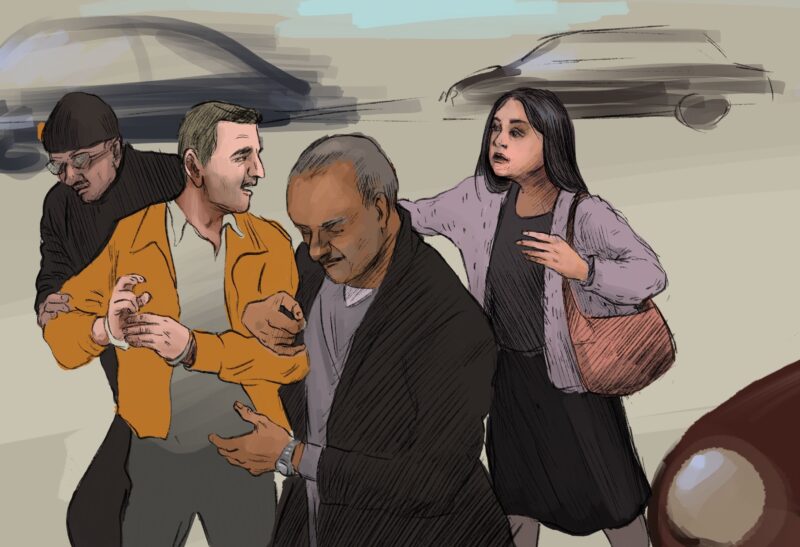World Blood Donor Day is 14 June. Marked since 2005, the day is simultaneously the birthday of Karl Landsteiner, an Austrian physician and immunologist who received the Nobel Prize in 1930 for his discovery of human blood groups
.
“Sea anemia”
In early April, civil activists actively began sharing the Blood Bank's post on social media that asked people to donate blood in response to serious blood shortage that threatened to lead to fatal consequences.
Back then, the chief doctor of the Central Blood Bank, Parvana Hajiyeva, told local media that a reduction in the number of blood donors due to the lockdown was creating problems for children suffering from thalassemia, hemophilia, and leukemia.
A large group of people in Azerbaijan who suffer from thalassemia consistently need blood transfusions. Thalassemia is a genetic blood disorder that is characterized by a reduced production of hemoglobin. The disorder develops because of a mutation in the gene that carries information about the synthesis of chains of globin – a protein that is involved in the formation of hemoglobin. As a result, its production stops or occurs in smaller quantities, blood cells are destroyed, and anemia develops.
Thalassemia, which, translated literally, means "sea anemia", is more common in peoples of Asia, the Near and Middle East, and African descent. It is not entirely clear yet why the disorder is widespread in these areas. According to one theory, the disorder was triggered by an epidemic of malaria which hit Mediterranean countries several centuries ago. The body's long fight against malaria triggered a mutation of the genes of some people who lived in these countries, hence the name of the disorder.
Azerbaijan is considered one of the largest foci of thalassemia. It is more often found in lowland areas. Doctors say that marriage between relatives is one of the main reasons why it is so widespread in the country. This exponentially increases the risk of a sick child being born.
At present, every 12th person in the country is a carrier of thalassemia. According to the Health Ministry, about 300 children are born with this disorder in Azerbaijan each year. On average, about 6 percent of residents of Azerbaijan are carriers of thalassemia. This is higher than in neighboring Armenia (1-2%) and Georgia (3%). Frequent blood transfusions – several times a month – are the main method for treating the disorder.
It was to prevent the spread of thalassemia in the country that amendments were made to the Family Code in 2014, under which people who want to get married must undergo a medical checkup for thalassemia, along with AIDS and syphilis. In carriers of thalassemia, the disorder can occur without any symptoms at all. At the same time, however, couples who are carriers of thalassemia stand a 25 per cent chance of having a baby with thalassemia and a 50 per cent chance of having a baby who will be a carrier. The severity of the disorder depends on the number of pathologically altered sections of DNA: One altered gene means an asymptomatic form, but a person with it becomes a carrier of the disorder and can pass it on to their children; two genes means a mild course of the disorder; three genes means a severe course of the disorder; and four genes is a rare type of the disorder that is poorly compatible with life.
“When the pandemic started, we thought – this is the end”
Kubra, 10, is one of those who can only live a normal life with frequent blood transfusions. She is the third child in the Akbarov family. Kubra was diagnosed with thalassemia two months after she was born. Ever since, she has been receiving blood transfusions two to three times a month.
"When the pandemic started, we thought – this is it. What are we supposed to do? They do not allow us to go out, it will be difficult," Kubra's father Elmaddin Akbarov tells us.
A delay transfusing blood may have very serious consequences, which is what her parents were worried about.
"Sometimes, we say that thalassemia patients can wait for two or three days or a week. Yes, they can wait, they can get a blood transfusion not immediately but, say, ten days later," explains Naila Guliyeva, the head of Azerbaijan's Thalassemia Federation. "But that results in a drop in their hemoglobin levels and damage to their organs – liver, heart, and spleen. Therefore, we try to transfuse blood to patients in time. If we wait for long, it may result in the patient's death."
"When her hemoglobin levels drop, her condition worsens drastically," says Khuraman Akbarova, Kubra's mother. "She shivers, her hands turn blue, and she gets blue spots under her eyes. She becomes nervous, sleeps poorly and loses her appetite."
As the child grows up, the frequency of transfusions increases, too. Previously, Kubra received one transfusion – one bag of blood (about 350-400 grams) – every fifteen days. Now, she needs two bags – two, sometimes even three, times a month.
Social media came to their aid
On Azerbaijani social media, you quite often come across posts asking people to donate blood.
The Akbarov family also confirms that sometimes, when Kubra needed blood, they looked for a donor through social media.
"Sometimes, I could not bring myself to ask friends, acquaintances, coworkers. I was too shy to do it. Sometimes, we paid for it," says Elmaddin Akbarov, Kubra's father. "I often donated blood, too, in order to find suitable blood for my daughter in return."
And then they decided to ask for help through social media:
"A neighbor's son started a Facebook page to help Kubra find suitable donors' blood. Thousands of students responded, saying they were willing to come and donate blood. We received phone calls almost non-stop. They were so many that we even began to forward phone calls to the parents of other children who also needed blood," Elmaddin says.
Experts are saying that there is no shortage of people who want to donate blood in the country. The only problem is the lack of a culture of blood donation. According to Leyla Guliyeva targeted blood donation is more common than continuous voluntary donation.
"Blood donation is a topic that needs to be talked about constantly," Naila Guliyeva believes. "And not only by state bodies but also by different NGOs. Celebrities or public figures should talk about what blood donation is, how blood donors benefit from it and who they help."
Within hours, hundreds of people responded to the Blood Bank's statement that they had run out of backup blood and its request for the population to donate blood. Incidentally, the country's First Vice-President Mehriban Aliyeva joined the request. Agshin Ibrahimov is one of those who responded to the call on social media.
"The post was published on 7 April, but already on 10 April, when a friend and I came to the bank, we were told that they did not need blood yet, meaning that they had collected enough blood within those three, or even two plus, days," Agshin says. "They took our contact numbers and said they would get in touch with us if necessary."
Young Kubra's father believes that although searching for donors through social media is quite an effective method, it is a temporary solution to their problem. Poor educational work is the reason for the frequent shortage of donated blood.
There are still few people who donate blood on a permanent basis, although Azerbaijan has been implementing a state program to promote blood donation since 2005. The program includes campaigning and conducting voluntary blood donation campaigns, printing posters, making public service videos and disseminating information about blood donation through mass media.
“Blood is life”
Orkhan Nabiyev is a voluntary blood donor. He has donated blood regularly since 2010.
"Blood is life, and we should share that life. We do not want to not be able to find blood when someone in our family also needs it. Therefore, we should donate so nobody is in need of blood. I also want to inspire people to do it and to make sure that they join the initiative," he says.
Naila Guliyeva says blood donors are "heroes". She says no drugs or medication exist as a substitute for blood, therefore blood donors are invaluable.
She adds that not only does blood donation save the lives of those who need blood but it also benefits donors.
"When you donate blood, your blood cells are constantly renewed, and your immune system is boosted. This also improves blood vessels in the human body and reduces the tendency of cardiovascular disease and strokes," Naila Guliyeva says. "Very often, people who become donors start paying more attention to their own health, as they feel responsible for being able to help someone else live."
"What a feeling it is to gift life to people. People should think about this. Donors do, I know. Let them imagine that they are gifting life to a girl or a boy. And let them donate blood," Elmaddin Akbarov says.
Produced with the support of the Russian Language News Exchange



